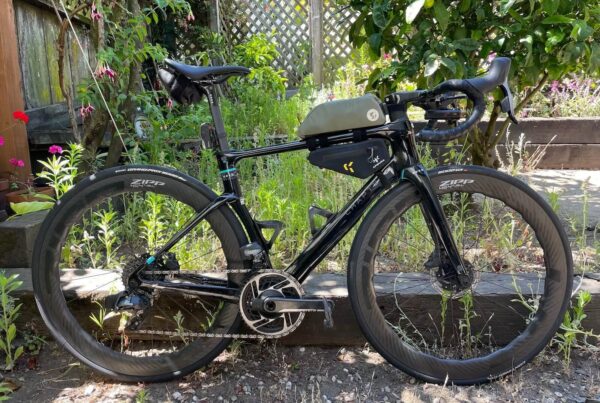This blog article featuring Bob Mionske has been reproduced here for our media archives. To access the original article, follow the link.
The Chicago Tribune: Bike safety: My 6-year-old was ‘doored’
By Julie Deardorff, Tribune Newspapers
July 7, 2011
Last weekend, my 6-year-old was doored — the driver of a parked car flung open the door in his path — while riding his two-wheeler with me in a designated bike lane in downtown Evanston. My son wasn’t hurt, but the driver took no responsibility for the incident and said, “I hope you learned a lesson, young man.”
The lesson for cyclists, of course, is that drivers generally don’t look before they open their doors, even if they’re parked next to a bike lane. They may also open the door, even if they seem to see you, something that recently happened to Chicago’s Robin Karlov.
“The driver said he saw me (I know since we made eye contact which is why I continued past him) but thought I was past. No dude, only two-thirds past,” Karlov, an experienced cyclist, posted on my Facebook page. “He later said he forgot (very short memory) and offered me $100. As if that would eliminate the bruises! Now I wish I had his cash to pay for the bike repairs, the arnica, the ice packs, the ibuprofen…”
Drivers should know that, by law, they are required to wait until it’s safe before they open the door. Chicago bike laws state, for example, “No person shall open the door of a vehicle on the side available to moving traffic unless and until it is reasonably safe to do so, and can be done without interfering with the movement of other traffic.”
There are no age restrictions on bike lanes. So in my case, it appears that if my son been hurt, the driver would have been negligent.
Still, if the accident had been my son’s fault, in Illinois, I could have been held liable in court if a jury found that I was negligent in the supervision of my son, said cycling attorney Bob Mionske, author of “Bicycling & The Law,” a book every cyclist should have.
In other states, my child could have been sued. In New York, for example, children under 4 are presumed incapable of negligence, but children age 4 and older are not presumed to be incapable of negligence.
“This is a reminder of something parents need to be aware of– they are responsible for supervising their children at a level appropriate for the child’s age, and for teaching their children to be careful,” said attorney Rick Bernardi. “It’s primarily for the child’s safety, but also to protect the parents from liability for the child’s actions.”.
Consider this New York case that Mionske and Bernardi wrote about inRoad Rights for Bicycling magazine, involving a sidewalk race on bikes between 4-year-old Juliet and her 5-year-old friend Jacob.
“As their mothers stood watching, the children accidentally collided with 87-year-old Claire Menagh and knocked her down. Menagh’s hip was broken in the fall; three months later, she died of unrelated causes.
“Two years after the accident, Menagh’s estate filed suit against the two mothers – and the children themselves. Juliet’s attorney attempted to have the lawsuit against her thrown out but was unsuccessful: In New York, the law allows anyone age four or older to be sued for negligence.
This is not the case everywhere. Laws in some states hold that children under the age of seven cannot be sued. If Juliet had crashed into Menagh in Illinois, the estate would have been able to file suit only against Juliet’s mother.
“Still, why would somebody sue a young child? Menagh’s estate was going after compensation from the parents’ insurance policies (either their homeowner’s or their renter’s), not the kids’ piggy banks, and suing Juliet and Jacob was another attempt to achieve that outcome. It’s like applying for more than one job – you’re increasing your chances of getting the result you want.
“Even if a child can be sued, the courts rarely hold kids to an adult standard of behavior when determining liability. Instead, the child is held to a standard that is appropriate for that youngster’s age, intelligence, maturity, and experience. Even so, it’s obviously best to try to prevent accidents in the first place.”
For cyclists, that means being extra vigilant while riding in bike lanes or supervising a youngster who is still learning the ropes.
Don’t wear ear buds; hearing the “click” of a car door might save your life. Ride outside the door zone, which means keeping a distance of 3 to 5 feet between your handlebars and the parked vehicles. You may have to “take the lane” or ride in the middle of the street, which is a cyclist’s right in most states, said San Francisco attorney Miles Cooper.
Cooper suggests looking for silhouettes or movement inside parked cars. “Look for taillights that have just gone out – those frequently indicate a driver is just about to get out of the car,” he said. Watch mirrors. And never, ever, assume a driver will be looking for you.
If you are hit, get the driver’s information, even if you don’t want to. Karlov said she was initially in so much pain that she didn’t bother. But when she called her husband, Jeff, he insisted.
Finally, keep in mind that while striking the door as you ride past can certainly hurt, “getting nailed by a passing vehicle,” as Mionske wrote in his book, can be far more deadly.



